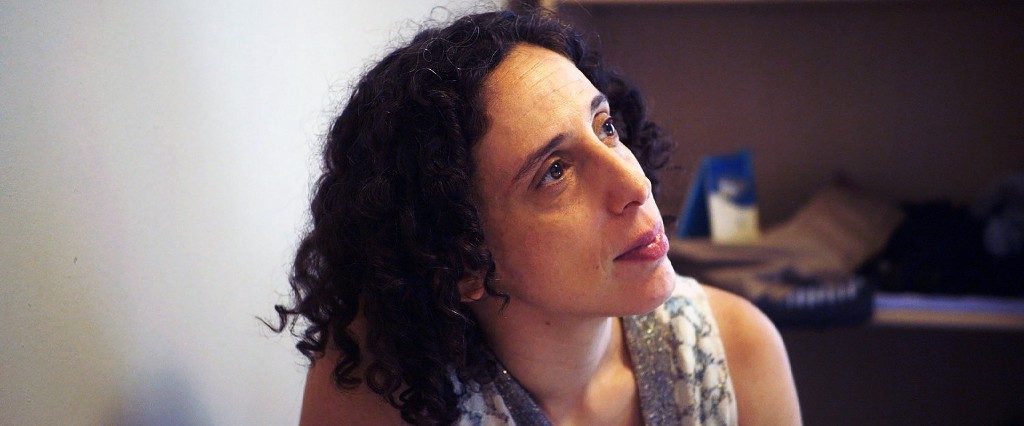Guest Post by Ela Thier
My new film, “Tomorrow Ever After,” got made because in addition to relying on women, I rely on the men I work with to act as my allies. I do it by offering information rather than blame or guilt. I asked my co-star and producing partner, Nabil Viñas, about the why and how of supporting women filmmakers. He shared his thoughts about what working with women has taught him, why women-directed films have something fresh to offer, and about why men need to talk about gender inequality in the industry.
“Tomorrow Ever After” opens May 5 in NY and LA.
ET: Why, in your opinion, should men support the work of female directors?
NV: Well, I can answer that a couple of ways.
As moviegoers, men should go see the work of female directors because the chances of experiencing something new goes way up. Men have dominated storytelling our whole lives, and these stories can get quite stale unless the men are taking some real risks. And I don’t mean sex and drugs risks — even that gets tired. I mean risks like being vulnerable and honest with yourself and your audience. If you’re not doing that, it’s likely we’ve seen your exact movie before.
Women have much to show and I don’t think we have any idea what we’re missing. I saw Deniz Gamze Ergüven’s “Mustang” recently and couldn’t believe my eyes. I’m aware of how some women are treated in conservative cultures, but that felt like a movie experience I’ve never had before. I also recently caught Annie J. Howell and Lisa Robinson’s “Claire In Motion,” [which also stood out]. These are films I just don’t think men could have made. I consider myself lucky to have found these gems. Most guys are missing out.
And filmmakers, your chances of being part of something fresh is more likely with a woman at the helm. So it’s in your best interest to seek them out and get involved.
ET: What, in your experience, can men in the industry, do to support female directors?
NV: Pay attention. Make a decision to take notice of the absence of women. Take notice when it’s a woman’s project and give it more thought. It’s easy to not think critically and do what “feels right.” I do it. But depending on your age and other factors, what feels right might may actually be really wrong, and include ridiculous stuff like “women belong in the kitchen” or some other archaic nonsense.
Also, read film criticism by women, like Cléo Journal, for example.
Oh, and listen. Never assume you know better. In fact, it might do us all some good if we approach every interaction with a woman filmmaker — all women for that matter — from the perspective that they may have something to teach us. Because they do, if we can hear them.
ET: Why do you think more men aren’t actively working to support female directors? What’s hard about doing that?
NV: Comfort and conditioning. It’s learned behavior to take men more seriously, in particular white men, even if a woman has the same qualifications or more. And it’s almost always subconscious — less choice and more a bad habit you don’t even realize you have. The only reason I have any inkling of awareness is from working with so many incredible women. So most men are oblivious or in denial there’s even an issue.
Also, filmmaking is really hard for men too! Getting a greenlight is tough. Bias is easy to miss when you’re facing impossible odds yourself. But we’re better off facing that alongside women. What’s that quote about going faster alone but further together? That’s what’s up.
ET: What’s it like for men to talk to other men about supporting women directors?
NV: Weird. I don’t think I do it. I’m more inclined to bring it up with women, probably to gain their favor, selfishly. I find straight men are just not likely to bring it up. We feel bad enough that there’s inequality, if we’re even aware, that when we’re with each other it feels better to take a break and talk about easier, simpler things. There must be a connection here to how I imagine white people might feel and avoid discussing race with each other.
Maybe putting this out can serve as a challenge to myself and guys who know me? Can we talk women directors? Is that cool?
Ela Thier is the writer, director and star of “Tomorrow Ever After,” which was named Best American Indie at the Fort Lauderdale International Film Festival. The film won numerous other major awards. Thier previously wrote and directed “Foreign Letters,” as well as several award-winning short films. Her short “A Summer Rain” has become a YouTube sensation. Thier independently teaches filmmaking in NYC under the alias of “The Independent Film School.”
Nabil Viñas is an award-winning actor born and raised in Washington Heights, NYC. He played Mussolini in “The World Wars” and has a leading role in “Tomorrow Ever After.” He’s a co-founder of The Seven Collective as well as an official member of Barefoot Theatre Company, Poetic Theater Productions, and the UNWomen #HeforShe campaign.







